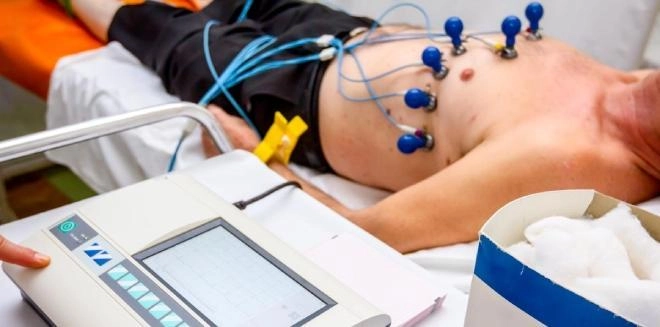Angina Pectoris
Angina pectoris is chest pain caused by an inadequate supply of Oxygen-Rich blood to the heart. It is usually experienced during physical stress, such as exercise or heavy Labour.
Common symptoms of Angina Include:
- Chest pressure or tightness.
- Shortness of breath.
- Dizziness.
- A feeling of fullness in the back of the throat.

While it can be caused by other conditions, such as high blood pressure, it typically signifies an underlying problem with the heart that requires further medical attention.
Angina Pectoris Causes
Angina pectoris can be caused by several factors, including lifestyle, medical conditions, and Genetic predispositions. Lifestyle factors such as Smoking, obesity, high cholesterol, diabetes, and an inactive lifestyle can increase the risk of developing angina.

Certain medical conditions, such as high Blood Pressure and coronary artery disease, can also contribute to angina. Finally, those with a family history of heart disease may have a genetic predisposition.
In sum, understanding the causes of angina is important to take preventative measures against developing or managing the condition if you are at risk.
Main types
Angina Pectoris is typically categorized into three main types: stable, unstable, and variant.
- Stable Angina Pectoris is characterized by predictable chest pain or pressure during physical activity or emotional stress and subsides with rest or medication.
- Unstable Angina Pectoris occurs when the chest pain is more severe and prolonged than usual, often occurring at rest and lasting for several minutes. It can be a warning sign of an impending heart attack.
- Variant Angina Pectoris (or Prinzmetal's Angina) typically presents as chest pain at rest, often waking a patient up from sleep at night. This form of angina can be caused by spasms in coronary arteries resulting in reduced blood flow to the heart.
The diagnosis of Angina Pectoris can often be confirmed with medical tests such as an electrocardiogram (ECG), stress tests, and imaging studies such as an echocardiogram or coronary angiography. We will discuss them in detail in the upcoming section.
Angina Pectoris Symptoms
Angina Pectoris is characterized by chest pain or pressure, often felt in the chest but sometimes in other body parts such as the arms, neck, jaw, and back.
The symptoms of Angina can range from mild to severe and may be accompanied by sweating, nausea, lightheadedness, or tiredness. Shortness of breath is also a symptom that can occur with chest pain or on its own.

If you experience any signs of Heart issues Such as Fatigue or Chest Pain ,seeking Medical Attention Immediately is Crucial. Dr.Abhijeet Palshikar at Cardiomet is Renowned as the Best Heart Surgeon in Pune, Providing expert Care and Treatment for Heart-Related Conditions. Don't Delay in getting help to prevent Further Stress on Your Heart and ensure a Healthier Future.
Diagnosis of Angina Pectoris
Diagnosis for Angina Pectoris starts with a physical exam, where your doctor will check your pulse, Blood Pressure and other vital signs. Your medical history and lifestyle habits may also be taken into account.

Diagnostic tests such as an electrocardiogram (ECG), stress tests, and imaging studies such as an echocardiogram or coronary angiography are usually used to confirm the Diagnosis of Angina Pectoris.
An ECG can provide important information on how your heart functions by measuring electrical activity from different areas of the heart. Stress tests involve performing physical activity while having sensors measure electric signals from your heart to record changes in its rhythms and Blood Flow.
Coronary Angiography Involves Using Dye Injected into your arteries to create detailed images of your heart's condition. This procedure can help detect any blockages or damage to the Coronary Arteries that may be Causing Chest Pain or Other Symptoms.
Angina PectorisTreatment
Treatment for Angina Pectoris can vary depending on the individual's health and the severity of their condition. Lifestyle changes, such as quitting smoking and engaging in regular physical activity, can help reduce chest pain and other symptoms for some people. Medications like nitrates or beta-blockers can also help control chest pain and relieve other symptoms.
If you're Dealing with a severe Blockage in your Coronary Artery, Surgical procedures like Angioplasty or Bypass Surgery Could be the answer.These procedures involve widening blocked arteries by using a Balloon or redirecting Blood flow with decorative blood vessels around congested areas.
Your heart health is of Utmost importance, so consult with Dr. Abhijeet Palshikar to explore all Treatment possibilities and make an informed decision tailored to your needs. Trust in his expertise and take a step towards a healthier heart today.
Discover Effective and Reliable for Angina Pectoris Treatment in Pune with Dr. Abhijeet Palshikar at Cardiomet.
Angina Pectoris Prevention
Prevention Is Key For Angina Pectoris, So Reducing Your Risk is Important.
- Maintaining a healthy weight through diet and exercise can help reduce your chances of developing this condition.
- Eating a balanced diet with plenty of fruits, vegetables, and whole grains can also help decrease your risk.
- Regular physical activity is especially important in reducing the risk of developing Angina Pectoris and other heart-related conditions.

Want to prevent Angina Pectoris and chest pain? Follow Dr. Abhijeet Palshikar's Advice in Pune, and make lifestyle changes like Quitting Smoking and Cutting back on alcohol consumption. These preventive measures can play a crucial role in reducing the risk of heart issues, keeping you healthy and safe.
To conclude,
Angina Pectoris is a condition that can have serious consequences, so it is important to understand the different treatment and prevention options available. Lifestyle changes such as quitting Smoking, engaging in physical activity, and eating a balanced diet can help reduce the severity of Symptoms and even prevent the occurrence of Angina Pectoris. Depending on the individual's condition, medications and surgical procedures may also be necessary.
If you experience any symptoms related to or suggestive of Angina Pectoris, seeking medical attention immediately for proper diagnosis and treatment is important. For further help, you can reach us at +91 9130058897 / +91 8208196544 or visit our clinic.


